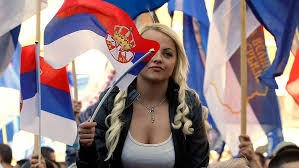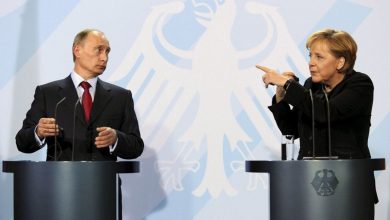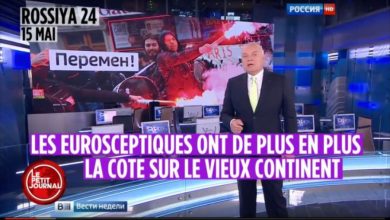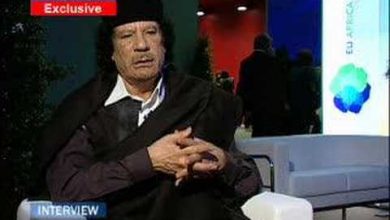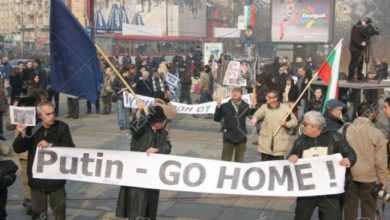Elections in Serbia: The Cure for Myth
Extraordinary parliamentary elections were scheduled for May 11, the pre-election silence under Serbian law falls to the country two days before the vote, that is, May 9, which became the occasion for the Victory Day – Europe Day holiday. Free concerts in the center of the capital, which is not emptying anyway, had no formal relation to the elections, and it was proposed to consider coincidence with the democratic slogan “For European Serbia” by chance.
Two days later, sociologists will announce the results of exit pools, and enthusiastic Democratic party fans will fill the city center again. But even the picky Russian observers will not particularly recall the little trick in the days of pre-election silence. Subconsciously, perhaps guessing that the Serbian system of political coordinates has much more axes than is commonly believed.
Sociologist’s mistake
Exit pools were no doubt accepted by everyone, immediately and unconditionally. Despite the fact that no one expected the success of the democrats thanks to the same sociologists who predicted them almost a catastrophe. On the day when, in honor of Europe Day, the Democrats handed out free CDs with Ode to Joy, an informal anthem of a united Europe, everyone had already memorized the public opinion polls, according to which the radicals from the party of Vojislav Seshel headed by Tomislav Nikolic) with good reason it was worth pre-stocking champagne.
And suddenly – the resounding success of the Tadic party, which received 102 mandates in the 250-seat assembly instead of those promised by sociologists 88. Political scientists and experts, whom I intended to honestly admit to understanding nothing, were ahead of me with a smiling bewilderment: I’m not able to understand nobody and nothing.
Why were sociologists mistaken? And who was not mistaken? And how can you not be mistaken in the Serbian elections? Dragan Popadic, a sociological professor at the University of Belgrade, shook his hands in dismay: “We cannot measure the mood in which there is so much irrational.”
“Kosovo?” The professor thought: “That’s the point. On the one hand, of course, Kosovo is an important factor. On the other hand, it has nothing to do with it. “
The ruins in the center of Belgrade, which will be 10 years old next spring, are not being taken apart. Either in this way preserving a peculiar attraction, or your hands just don’t reach, or maybe there’s simply no buyer who is ready to invest in reconstruction. The taxi driver, with visible pleasure, slows down at these ruins, so that I can watch and take a picture.
In a cafe nearby, the owner with patrons recalls that it was almost 10 years old as if everything had been yesterday, only without anger. “And Kosovo?” – “And what about Kosovo? We will return Kosovo. ” Also without passion and almost carefree.
“The funniest thing was that at best, maybe every tenth was in Kosovo,” smiles Ninoslav Rangelovic, once a professor of theology at Columbia University who returned home to make films about Kosovo Serbs.
His films, huge documentary material, do not need either the authorities or the opposition.
“Maybe the films are not anti-Albanian enough?” – “That’s not the point. It’s just that they show that the authorities really do nothing for these people. ” – “Will Kosovo be back?” – “Nope. The end of the story. “
Participation in the elections of Kosovo Serbs was also to become part of the struggle for the return of the region. “What is the format of this participation? I asked one of the organizers of these elections in Mitrovica and naively specified: “Do the Serbs vote like citizens who are abroad?”
The interlocutor seemed to be even a little offended: “Serbs vote like citizens located on the territory of their own state.” Moreover, as in all of Serbia, in Kosovo they elected not only the assembly, but also the local authorities, which, of course, would have no practical meaning. There is an Albanian quarter in the Serbian part of Mitrovica, before the Albanians were guarded by peacekeepers, now it seems that they are not in danger, and Serb children play with Albanian children. Only their parents smile politely at an attempt to talk: no, we don’t know either Serbian or English.
“They are not people,” their Serbian neighbor in a small store laughs, “they are Americans.” He voted, of course, for the radicals – there are few options, except perhaps for the Kostunica party. “And for whom? For Tadic? No, he’s for the Americans. ” Goods in the store, including from Pristina. “What is there to do?”
By five in the evening in Mitrovica, where a massive civil uprising was expected, less than a quarter voted. According to the final official figures, the turnout in Kosovo barely exceeded one third.
Amputation history
“Kosovo is a story of amputation. From the very beginning, ”explains Milutin Petrovich, a director who devoted all his creative enthusiasm to the success of the Liberal Democratic Party. – The leg was taken away because gangrene began. And the legs are no more. And will not be. But we do not seem to notice anything and shout: here it is, our foot, in place. “
Liberal democrats say what is universally considered a taboo. In a country where, without fear of pathos, they will tell you that the heart of Serbia is in Kosovo, and there is no doubt that this is a symbol of faith, liberal democrats recall Galileo and laugh at compatriots who believe that the sun revolves around the Earth, and primarily Serbia.
“And how do you even crawl over the 5 percent barrier?” – “Why is it strange? So, as we think much more than 5%. Tadic thinks so, but does not say. Do you think Kostunica believes otherwise? ”
The taboo system continues to operate. While changing somewhat. More recently, in the same way in intellectual circles, it was considered a little indecent to admit sympathy for the radicals. Now Professor Popadich is a little surprised: “You know, even among my students there are many who vote for Nikolic.”
The political spectrum is sustained in the spirit of harmonious symmetry. The flanks are occupied by liberal democrats who offer to get rid of phantom pains, and by Sheshel – Nikolic radicals, calling for a holy struggle for amputated limbs. And if these positions are simple and understandable, then in the center, where Tadic and Kostunica meet in the old battle, there is a genuine triumph of psychoanalysis.
From a formal point of view, the differences in their positions are not much more fundamental than the differences in the names of the parties themselves, giving an historical common past: the Democratic Party of Tadic against the Democratic Party of Serbia Kostunica. For the former, first Europe, but with the declared faith in returning to Kosovo, for the latter, Kosovo above and above all, and only then Europe. “Kosovo is Serbia,” flags fluttered at rallies of Kostunica, party youth wandering around the city at night, painting walls with messages like “Tadic is Judas!” And questions like “Where is your heart in Kosovo or in Luxembourg?”
And in fact, there is a small substitution. Both parties, called democratic, actually become quite an instrumental way not to vote for those on the flanks, where the positions are clearer and clearer. Those who vote for Tadic have no more illusions about the return of Kosovo than those of the liberal democrats. But indecent.
And in the same way, voting for Kostunica becomes a salvation for those who are still embarrassed to admit sympathy for Seshel. The only difference is that there are more shy democrats than shy radicals.
“For whom?” I asked a young man from a small town in Vojvodina. “For Kostunitsa. Or for Nikolic. Not decided yet. Probably still for Nikolic. ” The difference is slipping away.
“Is Kosovo’s independence irreversible?” I asked one of Kostunica’s close associates. With a little tired fatigue, he answered: “Nothing is irreversible. We will return Kosovo. Maybe not today. Maybe in 10, 20 years. But we will return. “
This is perhaps the only way to somehow reconcile integrity with realism. And somehow technologically satisfying the electoral expectation: if even amputation, then maybe in 20 years the art of sewing will reach unprecedented heights, and before that it is proposed to wait and be patient. All, in general, without cheating. “But of course there is a problem,” he admitted.
The problem is that with each new election, the party loses a dozen mandates. “Yes, our position is not too convincing for those who choose between us and Nikolic. Nikolic is clear. He is also a favorite. And you can not be shy anymore. ”
We continue to talk about Kosovo as the main motive for the vote. “Do you really think this is the main motive?” He smiled: “No, of course. But who can you explain this to? ”
Perfect packaging
Neboisha Bakarets, one of the politicians close to Kostunica, is also sure that Kosovo can be returned, but this topic is not openly fascinating to him. He says about Europe: “We must not forget that in terms of Serbia’s integration into Europe, the champion is by no means Tadic, but Kostunica, who, incidentally, is the Prime Minister.”
And it is true. Many of those who sympathize with Tadic today agree that it was Kostunica, and not President Tadic, who, in fact, did all the concrete work on preparing agreements with Europe.
“The fact of the matter is that, contrary to stereotypes and slogans, Tadic is by no means a monopolist of the European idea,” said the famous Serbian political scientist Dusan Janic. – Just like Nikolic is not a monopolist of the Kosovo idea. Ideas are airborne and distributed in batches. And by the way, among those who vote for Nikolic, anti-Europeans do not constitute the majority either. ”
The radicals about Kosovo also reason with all the necessary formality. Kosovo and Europe are just a shell. The system of slogans. And the highlight of their program, oddly enough, is by no means Kosovo, but the fight against corruption that is understandable to everyone.
If you look closely at the collective portraits of the voter, you will find out a very simple and not at all purely Serbian detail. Voter Nikolic lives in a village or in a small town, not too different from the village, secondary education and below average, as well as affluence. The voters of Kostunica and Tadic are not particularly different from each other according to these formal characteristics: they are middle class, education and wealth above average, except people similar to the Nikolic voter are adjacent to Kostunica. The Liberal Democrats’ elector is one in one Tadic’s voters, except that he is younger and during the struggle against Milosevic he was seen in the Otpor youth movement.
And it turns out quite a normal picture, which absolutely does not require any Kosovo. Liberalism in the most banal way becomes the lot of the prosperous and urban, while the populists are successful with the lumpen.
With my random acquaintance in a cafe, we are no longer talking about Kosovo. “Look at what your democrats have brought to the country. Who is involved in privatization, banks? Ministers from Tadic! ”The Tadic party acknowledges the problem. Fans of Kostunica, grimacing a little, admit that his government delegates are not much better. There are no radicals in the government, but they are at the local level and in Novi Sad, where through the efforts of Serbian refugees from Bosnia and Croatia, local elections have always become a triumph of the radicals. Now the local voters are telling about their local authorities with the words of Saltykov-Shchedrin.
But outside their estates, the radicals are in eternal opposition, and this is also not revealed by the Serbs: the theme of the fight against corruption fits very effectively into the anti-Western system of slogans. And if we ignore the local political highlights, the Serbian confrontation comes down to the same thing: under the sign of the fight against corruption, there is a struggle with cosmopolitans and liberals.
And the election turned out as an election: no one believes in the purity of party ranks, so regular revelations are pointless, some vote to imprison the stealing democrats, others – to simplify life for business and the Western vector.
Anyway, Serbia is a country of fans, Tadic against Kostunica is like Partizan versus Crvena Zvezda, a walk in honor of a democratic victory is like a fun procession of football fans, and a fan knows better than anything: victory or defeat has nothing in his life will not change, which does not cancel the holiday at all.
It’s like that. But the Kosovo theme is a little distorting and confusing.
“Why the hell I will vote for the Liberal Democrats,” a friend explained to me, “if it’s not a fact that they will pass at all.” “And in general,” his democratically-minded friend added passionately, “why are they fighting Tadic with such hatred?” They don’t even fight against Nikolic. ”
But in Serbia there is also Kosovo. Ideal packaging for ordinary politics. Those who preferred Europe at the cost of Kosovo, even if the editorial board of Tadic, turned out to be a little more than what sociologists expected. According to skeptics, there is probably nothing systematic and deeply promising in this. Simply, they say, a few days before the election, an agreement was signed with Fiat on the construction of an automobile plant in Kragujevac. And two days before the election, the government ratified a cooperation agreement with the European Union. The ministers from the Kostunica party, however, left the room at the time of signing, regarding it as refusing to continue the struggle for Kosovo. However, they returned to sign another document – on cooperation with Gazprom. It was on the day of the pre-election silence, but, of course, the whole country found out about it, which again was offered a choice between the West and the East.
The choice was not in favor of the latter. Although in fact this choice has long been gone. And the one that is available is formulated in a completely different way.
Serbian bills
Everyone wants to Europe – both democrats and radicals, and in private conversations even the latter smile knowingly at the mention of our brotherhood. Even Nikolic does not know the Russian language; in news reports, Russia passes no more often than any other country, and certainly less often than America. Orthodoxy for Serbs is not so much a religion as a way of self-identification, which is understandable for a vast space inhabited by Slavs who speak almost the same language, but who have recently destroyed each other in ethnic cleansing.
“The role of Orthodoxy and Slavs, of course, is understandable,” Popadich, a sociologist and social ecologist, is struggling to unravel our unity. “But why then do we not love the Bulgarians – the most Slavs and Orthodox Christians?”
In a word, and to this myth here, in an ordinary European, but poor and much survived country, they also know the price well. And they don’t say either – it’s also almost a taboo, almost a doubt about the eternal primacy of Orthodoxy.
The question is not whether to go to Europe. The question is different: how? And not when – before Kosovo or after. That is, you can continue to argue in this vein, knowing full well that this is a ploy. The fact is that Europe, almost in the middle of which Serbia is located, is infinitely far for most of its inhabitants. They want to go to Europe, but 20% of the population have a passport on their strength, and money is not enough not only for travel, but even for a visa. What do you want in this situation – justification of your resentment towards Europe or, conversely, all-round rapprochement with it and the abolition of visas? And here it comes out like from Kosovo. Under the guise of one, another is chosen. With the words of resentment – rapprochement.
But this is not all, and even, perhaps, not the most important thing. “We all want to go to Europe,” liberal democrat Milutin Petrovich continues to expose compatriots. “But so that everything remains as before, as under Milosevic, but without it, so that Europe does not come to us with its agricultural products and, most importantly, returns Kosovo to us.” Well, it is desirable that Yugoslavia be restored – led by us, of course. ”
“Does the Serbs feel guilty?” Or at least a suspicion on this score? ”-“ No. We are the victims, and the enemies around us. ”
In this, it seems, lies the main nuance of the vote. The few marginals who vote for the liberal democrats understand everything about the reasons for the current Serbian situation. Voters for Tadic, in general, too, but the formula with which he goes to the polls allows the thought of guilt not to hurt himself.
On the other flank, where they choose between Kostunica and Nikolic, everything is simple: the country is surrounded by enemies. “Perhaps this is our brotherhood,” Petrovich guessed gloomily.
Serbian calculator
The morning after the election, slowly waking up, the country took up the calculator. For the majority in the assembly, 126 mandates are needed. To their 102 mandates, the Democrats added 13 more close liberal democrats and several representatives of national parties who traditionally sympathize with Tadic and who should have gathered another 7-8.
On the other hand, as some knowledgeable people from Russia admit, Moscow managed to convince Kostunica of the need for a coalition with the radicals. Despite the apparent evidence of such a continuation, it was said that it was not easy to convince.
“There will be no turning back from the coalition with the radicals,” one of Kostunica’s ideologists explained his doubts. – That is, without prejudice to the party, we will not leave this union. And most importantly, what will we be in this coalition if Nikolic has two and a half times more seats? ”
The socialists are afraid of Nikolic, for the same reasons, and historically they did not have the best relations. And the situation becomes completely confused because the political habit in Serbia has become a comic truism of the radicals’ habit of being in opposition and the associated fear of a full victory. “Radicals in power – this would be, by the way, the best option. And the Democrats should go into opposition, ”with a smile, but at the same time, Janich is seriously planning the future.
With the same smile, this idea is accepted by many, including those sympathizing with the democrats: Nikolic himself will not go to the premiere, and he will hardly find a person in his ranks for such a position. And there is no reason: for such a responsibility there is always Kostunica, who is ready to be the prime minister even at the cost of drying out the party and who, in the eyes of the West, will remain a man passionate about European integration. Consequently, no Nikolic is already dangerous to this advancement. And according to the results of the activities of such a coalition in the next election, even more convincing than today, the victory of the Democrats will not be a sensation for anyone.
Elections in a country that is split in two are usually extraordinary. And in any case, speedy. Such a continuation of the ghost hovers over any of the possible coalitions – none of the combinations discussed promises to be strong. Especially since, according to rumors, Tadic and Kostunica have already begun negotiations, because of the breakdown in relations that had to hold the current elections. Rumor was passed from mouth to mouth as a joke, which nothing prevents to come true. There is no cause for concern, and if Tadic comes to power, this will become a joke at all. Anyway, by and large, nothing will change. Serbia will go to Europe in accordance with the roadmap agreed upon with it, while continuing to fight for an amputated Kosovo. And defeat is indistinguishable from victory. A healthy laugh, perhaps, is the best cure for myths and phantom pains.
Serbia seems to be gradually preparing for the next election. Of course, with an equally festive break for the Eurovision finals.
This post is also available in:
 English
English  Русский (Russian)
Русский (Russian)

